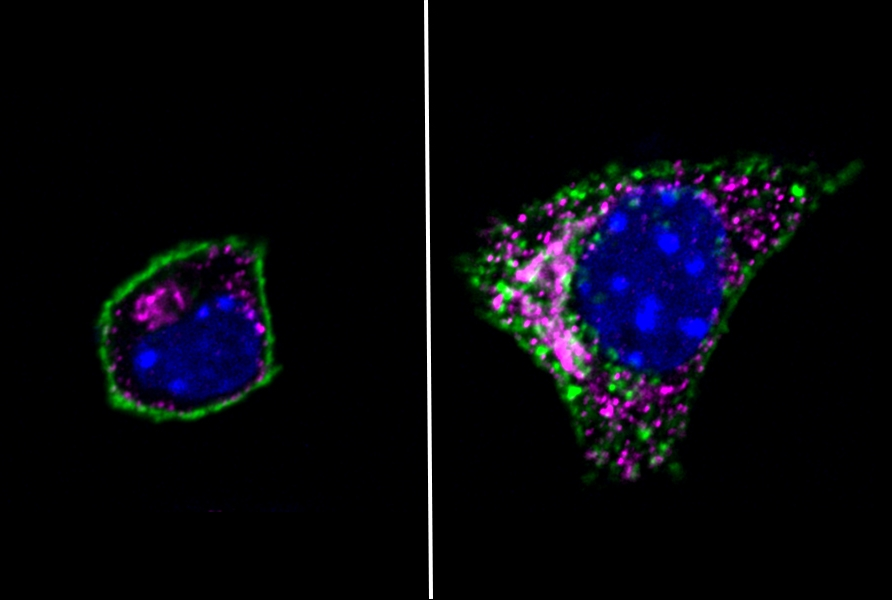
images of insulin-producing beta cells show the GIP receptor Q354 variant
Researchers at Weill Cornell Medicine found insight into the role of a genetic variant in combating obesity and how genetic variations can affect one’s susceptibility to weight gain. They focused on a genetic variant that is found in the glucose-dependent insulinotropic polypeptide (GIP) receptor which is known for stimulating insulin and associated with leaner BMI. In order to study and understand the mechanics of this variant, researchers used CRISPR-Cas9 technology. They used this to genetically engineer mice with the variant in the gene that encoded the GIP receptor. They found that the mice with this variant tended to stay leaner and processed sugar more efficiently than the other mice with a different common variant of the receptor. Researchers found that there was a bigger difference between the female subjects with and without the gene variant compared to the male subjects who, as a group, experienced little differences when consuming a regular diet. They did find that both male and female mice were protected from obesity by the gene variant when they were fed a high-fat diet, unlike the other litter without the variant, which suffered from obesity. The variant caused a high sensitivity to the GIP hormone that triggers insulin release in mice. Insulin regulates blood sugar levels and helps convert food into energy. More insulin was produced by the pancreatic cells in response to both the glucose and GIP hormone which would explain the increased efficiency in processing glucose.
Researchers stated that on a cellular level the GIP receptors and their effect/behavior impact metabolism and weight gain/loss. More research needs to be done to confirm the effects of the variant and researchers also claimed that they want to study the differences in the receptor’s behavior in other types of cells. They more specifically mentioned brain cells as they could play a crucial part in the sensation of “hunger” and potentially regulate it. In pursuit of a precision medicine approach, they stressed the importance of understanding how different genetic variants in the GIP receptor responded to the available weight loss medications that are currently on the market in hopes of matching a specific weight loss drug to a specific genetic variant. It is interesting to see the steps that it takes to reach this goal and how this provides an important piece of the puzzle for tailored weight loss treatments based on an individual's genetic variants.
Links:
https://www.sciencedaily.com/releases/2023/12/231207161355.htmhttps://news.weill.cornell.edu/news/2023/12/specific-genetic-variant-may-help-prevent-obesity#:~:text=Genetic%20Variants%20of%20the%20GIP%20Receptor&text=%E2%80%9CStudies%20suggest%20that%20people%20with,biochemistry%20at%20Weill%20Cornell%20Medicine.
I enjoyed reading this article. Many people battle obesity and seeing that researchers have discovered how genetic variations can affect an individual's susceptibility to weight gain is fascinating. I also enjoyed reading about the Glucose-dependent Insulinotropic Poplypeptide (GIP) receptor which stimulates insulin and is associated with leaner BMI.
ReplyDeleteI really enjoyed this reading band the picture shown of insulin producing beta cells. 39.6% of people in the U.S. are obese which shows that its more than a quarter of the population. Obesity is dangerous because it can result in problems like high blood pressure, diabetes. and etc. By regulating the sensation of hunger in the brain can help individuals from overeating. The GIP receptor helps in obtaining a lower BMI which can result in weight loss.
ReplyDelete